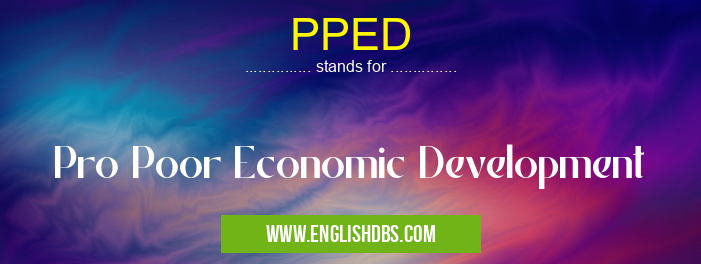What does PPED mean in
PPED (Pro Poor Economic Development) is a comprehensive approach to economic development that prioritizes the needs of the poor and marginalized. It aims to create an equitable society where everyone has the opportunity to improve their quality of life.

PPED meaning in in Governmental
PPED mostly used in an acronym in Category Governmental that means Pro Poor Economic Development
Shorthand: PPED,
Full Form: Pro Poor Economic Development
For more information of "Pro Poor Economic Development", see the section below.
» Governmental »
What is PPED?
PPED is a multi-faceted approach that focuses on:
- Poverty reduction: Implementing strategies to lift people out of poverty through income-generating activities, social protection, and access to basic services.
- Economic growth: Promoting sustainable economic growth that creates jobs and reduces inequality.
- Social inclusion: Empowering marginalized groups through education, healthcare, and access to decision-making processes.
Key Principles of PPED
- Participation: Involving the poor in the design and implementation of development programs.
- Empowerment: Giving the poor control over their own lives and livelihoods.
- Sustainability: Creating programs that can be sustained over time without external support.
Importance of PPED
PPED is essential for creating a just and prosperous society because it:
- Reduces poverty: By providing opportunities for the poor to improve their income and access to essential services.
- Promotes economic growth: By creating a more skilled and productive workforce, and expanding markets for businesses.
- Enhances social inclusion: By breaking down barriers to participation and giving everyone a voice in their own development.
Essential Questions and Answers on Pro Poor Economic Development in "GOVERNMENTAL»ECONOMY"
What is Pro-Poor Economic Development (PPED)?
PPED is an approach to economic development that prioritizes improving the lives and livelihoods of the poorest and most vulnerable people in a society. It focuses on empowering individuals and communities to participate in and benefit from economic growth.
What are the key principles of PPED?
PPED is guided by principles such as:
- Inclusion: Ensuring that all people, regardless of their socioeconomic status, have access to opportunities and resources.
- Empowerment: Enabling individuals and communities to make decisions and control their own development.
- Sustainability: Promoting economic growth that is environmentally and socially responsible.
How does PPED differ from traditional economic development approaches?
Unlike traditional approaches that often focus on overall economic growth, PPED emphasizes reducing poverty and inequality. It prioritizes investing in sectors that directly benefit poor and vulnerable populations, such as healthcare, education, and job creation.
What are some examples of PPED programs?
PPED programs can take various forms, including:
- Microfinance: Providing small loans and financial services to low-income entrepreneurs.
- Community-Based Development: Supporting local communities in identifying and addressing their own development needs.
- Social Protection Programs: Providing safety nets for vulnerable populations, such as food stamps or healthcare subsidies.
How is PPED measured and evaluated?
PPED is often evaluated based on indicators such as:
- Poverty reduction rates
- Improvements in health and education outcomes
- Empowerment of marginalized populations
- Job creation and economic growth
Final Words: PPED is a crucial approach to economic development that focuses on improving the lives of the poor and marginalized. By implementing its principles of participation, empowerment, and sustainability, we can create a more equitable and prosperous society for all.
